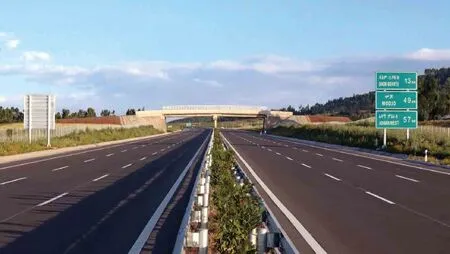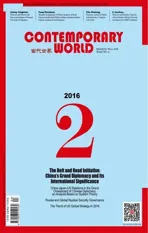China-Africa Relations Raised to a New High
2016-11-23LIAnsHAn
LI AnsHAn
Professor and Director, Center for African Studies,Peking University and Supervisor of PhD Candidates
China-Africa Relations Raised to a New High
LI AnsHAn
Professor and Director, Center for African Studies,Peking University and Supervisor of PhD Candidates

The picture taken on November 3, 2013 features the Addis Ababa - Adama Expressway constructed by China Communications Construction Group Corporation. This is the very first expressway in Ethiopia.
The world pattern is undergoing the most profound change since the end of the World War II. As the world is moving toward a multipolar one, the say of developing countries in the international affairs is on the rise. Among the emerging economies, China plays an ever increasingly important role. The African economies have enjoyed a stable development of about two decades, at an annual growth rate of 5% on the average. As the growth of Chinese economy has slowed down, the Chinese Government, based on the realization that the previous mode of economic development cannot be sustained,has come up with the “new normal”, that is, to develop a low carbon, green economy. With China's “new normal” of economic development, a new blueprint of China-Africa cooperation is on the horizon.
At the China-Africa Summit in South Africa, China-Africa cooperation was raised to a new stage. As it is known to all that the growth of a modern economy is a process of continued increasing of labor productivity and industrial elevation, one moving from low value production to high value production. Therefore, it is essential for a country to, proceeding from its national conditions, understand its comparative advantage. In China, as labor cost increases and as there is a large production capacity, it is necessary for labor-intensive industries to open up its activities overseas whereas in African countries to develop labor intensive industries is to increase productivity, create jobs and improve the living standard of the people. The focus of China-Africa cooperation will shifts to investment. Being at different stages of development, China has a surplus production capacity in ores,iron and steel, cement, glass, rubber and electric power whereas many African countries are in want of such capacity in their industrialization. On the one hand, the industrialization of African countries builds momentum and needs fund, machinery, technology and managerial know-how so as to develop human resources in manufacturing, and on the other, China'ssurplus production capacity calls for economic restructuring and industrial elevation, where a new opportunity to expand China-Africa cooperation takes place. China-Africa economic and trade cooperation will expand to various areas including trade, manufacturing and financial cooperation.
All countries face three fundamental tasks of ensuring food supply, providing jobs and securing public health,the African countries being no exceptions. In the new stage of cooperation after the China-Africa Summit, China will help Africa to build three major systems, namely an industrial system of sustainable development, a food security system and a prevention-andcontrol system in public health and will help address two bottleneck issues in development: lacking of infrastructure and human resources. China and Africa will advance bilateral cooperation, particularly exerting efforts in industrialization, agriculture, public health, cultural exchange and peace and security.
Another important aspect in China-Africa relations is to strengthen people-to-people relations. Concerning all kinds of fabrications and misgiving about China-Africa relations, a fundamental question is what is the general view of the African people on China?According to PEW Research Center's“Opinion of China” survey, there is a general favorable opinion on China among the African interviewees,among whom the most outstanding are from Ghana (80%), followed by Ethiopia, Burkina Faso (75%) and Tanzania (74%), then by Senegal, Nigeria and Kenya (70%) and the last one being South Africa (52%). On the whole,people of Africa have a positive view on China. However, it does not mean that it is unnecessary for the Africans and Chinese to enhance mutual understanding. The people-to-people relations are the foundation for bilateral state-to-state relations.
This writer has written about various misunderstandings between China and Africa in an essay. In order to consolidate bilateral relations in various fields, it is essential to expand mutual understanding between the two sides. Recently, a book titled “CHINA-AFRICA 500: Facts about China, Africa and Relations Between the Two” has been launched, which will greatly promote mutual understanding and mutual learning and is of great help to the young people. Without understanding the culture of the other side, bilateral relations would concentrate on economic or material aspect alone, which could be neither deep going nor long lasting.
China-Africa Cooperation Forum has been around for 15 years and achieved a number of great successes. Taking Ethiopia-China cooperation for instance, it has created a number of firsts, the first turnpike high-speed road, the first wind-power project, the first light railwayin Addis Ababa, the first modern railway. Such improvement in infrastructure both helps attract foreign investment and provides a favorable environment for developing local industries and economic prosperity.
Of course, there are great challenges facing China-Africa cooperation, such as, how can the goal of sustainable green development be achieved in an African continent endowed with abundance of natural resources? How can dialogue mechanisms for China-Africa cooperation be made more effective?How to better use the platform of China-Africa Cooperation Forum to promote mutual understanding between China and Africa and how to make countries and peoples of the rest of the world to better understand this forum?
A challenge in face of China is how to coordinate relations with various African countries and how to cooperate with the African Union and subregional organizations. In conducting cooperation with Africa in production capacity, it is necessary to strengthen quality control on sustainability and environmental protection and not to transfer polluting factories to Africa. As for Africa, it should be more active in taking part in strategic planning of China-Africa cooperation, where there is room for improvement. Both China and Africa should strengthen peopleto-people and grassroots contacts, as it will not be sustainable just to focus on summit diplomacy. More important,besides making joint efforts in consolidating China-Africa Cooperation Forum on material level, it is necessary for both sides to strengthen mutual learning on cultural level. It is necessary to mobilize the initiatives of more forces in the society and to involve them in the cause of China-Africa cooperation. For example, the industrialists who make great contributions to bilateral relations should play still more active role in China-Africa Cooperation Forum, the same being true for other social forces such as women,youth and people from all walks of life.
Equality has always been a principal objective for various social movements in human history and a necessary content in the constitutions of almost all countries. However, such a concept has never been emphasized in international politics, “might is right” becoming its golden rule. It must change. China-Africa Cooperation Forum and other international forces should contribute to changing such inequality in international politics, making efforts in making pertinent international rules. For instance, Africa is a vast continent endowed by various kinds of natural resources, but many rules on natural resources are made exclusively by other people. Are such circumstances reasonable? China-Africa Cooperation Forum can and should do something about it.
The China-African Summit held in South Africahas brought abouta new opportunity for the development of China and Africa. China's industrial restructuring presents a good opportunity for Africa to upgrade its industrialization. Cooperation in production capacity is not only mere export of commodities but also cooperation in capital, technology, machinery and managerial skills. It will effectively help African countriesto build up a comprehensive industrial system and production capacity. Such is interaction and complementarity of China-Africa cooperationin production capacity.
